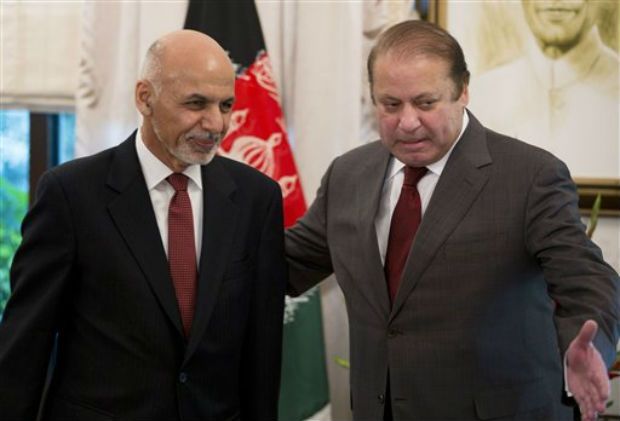Sharif, Ghani Meet On Paris Summit Sidelines
Ghani and Sharif

NEW DELHI: Pakistani Prime Minister Nawaz Sharif and Afghan President Ashraf Ghani met on the sidelines of the UN climate change conference on Monday to discuss bilateral ties and possible ways to resurrect peace talks with the Taliban.
Sharif’s office released a statement confirming the meeting, saying, “"Both leaders agreed to work with all those who would enter such a process as legitimate political actors, and act, alongside the Afghan government, against those who refuse to take the path of peace."
Relations between the two countries have been strained off late, with a nascent peace process between the Afghan government and Taliban -- which had been brokered by Pakistan -- being called off following Taliban leader Mullah Omar’s death. Confirmation of the death led to a power tussle within the Taliban, and saw an upswing in militant-led violence in the conflict-torn country.
The violence led to a dip in Afghan-Pak relations, with Ghani accusing Pakistan of not doing enough to rein in terror. Afghanistan has long maintained that Pakistan harbours and fosters terrorism, by aiding, training and sheltering the Afghan Taliban. Pakistan denies the charge. The widely held belief that Pakistan has a role to play in terror in Afghanistan was the cause of strained relationship between the two countries, with former Afghan President Hamid Karzai being one of Pakistan’s most outspoken critics. Ghani, however, attempted to sing a different tune by reaching out to Pakistan in a bid to use Pakistan’s leverage on the Taliban for a peace dialogue.
The strategy seemed to be bearing fruit, with the Taliban agreeing to a peace dialogue with the Afghan government in July -- a first in the 13 years since the fall of the Taliban government. The talks, and with it Afghan-Pak relations, hit a roadblock in August, when the death of Taliban leader Mullah Omar spurred a particularly bloody period in the conflict-torn country.
Although Pakistan and Afghanistan tried to hold a few high level meetings to keep their engagement on track, soon enough Ghani was using the same harsh rhetoric against Pakistan as Karzai used to, blaming the neighbouring country for not doing enough to rein in terrorists.
Till this point, there was an upswing in relations as Ghani soon after being sworn-in visited Pakistan, and then Pakistan’s army chief and head of intelligence visited Kabul.Delegations from the two countries made visits across the border; six Afghan army cadets were sent to Pakistan for training; military efforts were coordinated across the shared border; and Ghani and Pakistani Prime Minister Nawaz Sharif both issued statements in support of cooperation and bilateral ties.
The two countries even signed an agreement between Afghan National Directorate of Security (NDS) and Pakistan’s Inter Services Intelligence (ISI) -- a move widely criticised by the camp opposing the betterment of ties.
Then Ghani’s trip to Washington happened, where US President Barack Obama announced the decision to slow troop withdrawal. The Taliban, in turn, issued a statement vowing to continue fighting. "This damages all the prospects for peace, Taliban spokesman Zabihullah Mujahid said of the announcement. “This means the war will go on until they are defeated.”
All this has been the source of much criticism. In an interview with The Guardian, former Afghan President Hamid Karzai -- said that the country’s historic struggles against British imperialism and Soviet invasion will have been in vain if it succumbs to pressure from Pakistan.
This view was echoed by Karzai’s associates who sat in on the interview. Rangin Dadfar Spanta, a former foreign minister and national security adviser said that the policy amounts to the humiliating “appeasement” of a hostile power who would never change its ways. In a similar vein, Omar Daudzai, one of the most influential officials of the Karzai era who served as chief of staff and interior minister, predicts, “There could be a bloody summer, there will be fighting and there will be disappointments on the dialogue table from time to time.” Daudzai, a former ambassador to Islamabad, added that whilst he thought Ghani’s attempts to woo Pakistan were “courageous,” they would ultimately fail to change the country’s behaviour. “He has taken controversial steps that his predecessor didn’t take, and now we have to wait to see whether the Pakistani side is sincere or not,” he said. “But I am far more sceptical than I ever was before about Pakistan’s sincerity.”
And this is by no means an isolated view. An important figure within Afghanistan, Karzai echoes a distrust that runs deep with the Afghan people.
Ghani had taken a major gamble by reaching out to Pakistan, as the move was unpopular with powerful critics within Afghanistan. With relations having hit a major roadblock, Ghani -- more than anyone -- may be hoping that the meeting with Sharif on the sidelines of the Paris summit translates into action back in South Asia.



